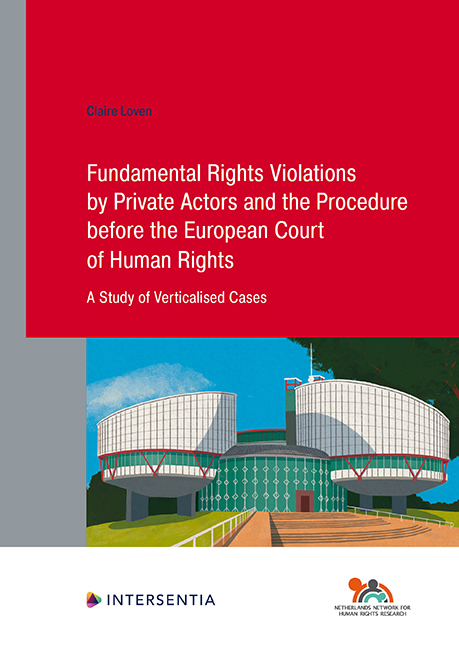 Fundamental Rights Violations by Private Actors and the Procedure before the European Court of Human Rights
Fundamental Rights Violations by Private Actors and the Procedure before the European Court of Human Rights Published online by Cambridge University Press: 29 February 2024
INTRODUCTION
This chapter discusses the implications of verticalisation by examining problems that can manifest themselves during the Court's proceedings and, more specifically, by examining the extent to which the important aspect of verticalised cases – the fact that one of the original parties to the conflict is not involved in the Court's proceedings – presents challenges for the Convention system. Attention is paid to the perspectives of private actors (Section 2), Convention States (Section 3.1) and the Court (Section 3.2), with the extent to which problems arise during the Court's proceedings being assessed for each different actor in turn. The discussion regarding private actors concerns whether it is problematic that the private actor involved in the conflict at the domestic level, not being the applicant, is not formally involved in the Court's proceedings unless he intervenes as a third party. The implications of this situation for the position of Convention States are also examined. Finally, and in relation to the Court's perspective, the question of whether the Court is provided with a full and balanced account of the facts and the rights and interests involved in verticalised cases is considered.
PRIVATE ACTORS
The notion of the ‘disappeared party’, referring to the private party who is involved in the conflict at the domestic level, but who ‘disappears’ from the conflict when the case comes before the ECtHR, was mentioned in the introduction to this part of the research. Despite being one of the original parties to the conflict, the disappeared party will be unable to defend his acts, interests or rights in the ECtHR procedure unless he intervenes as a third party. This holds true for all four types of verticalised cases examined in this study; i.e. to cases related to one's surroundings, to the right to reputation and respect for private live versus the right to freedom of expression cases, to family life and to employer-employee cases. The extent to which problems may arise in this regard depends, however, on the nature of the Court's approach, as explained in more detail below (Section 2.1). How the Court's approach to verticalised cases may give rise to problems for private actors is subsequently discussed more generally (Section 2.2).
To save this book to your Kindle, first ensure [email protected] is added to your Approved Personal Document E-mail List under your Personal Document Settings on the Manage Your Content and Devices page of your Amazon account. Then enter the ‘name’ part of your Kindle email address below. Find out more about saving to your Kindle.
Note you can select to save to either the @free.kindle.com or @kindle.com variations. ‘@free.kindle.com’ emails are free but can only be saved to your device when it is connected to wi-fi. ‘@kindle.com’ emails can be delivered even when you are not connected to wi-fi, but note that service fees apply.
Find out more about the Kindle Personal Document Service.
To save content items to your account, please confirm that you agree to abide by our usage policies. If this is the first time you use this feature, you will be asked to authorise Cambridge Core to connect with your account. Find out more about saving content to Dropbox.
To save content items to your account, please confirm that you agree to abide by our usage policies. If this is the first time you use this feature, you will be asked to authorise Cambridge Core to connect with your account. Find out more about saving content to Google Drive.